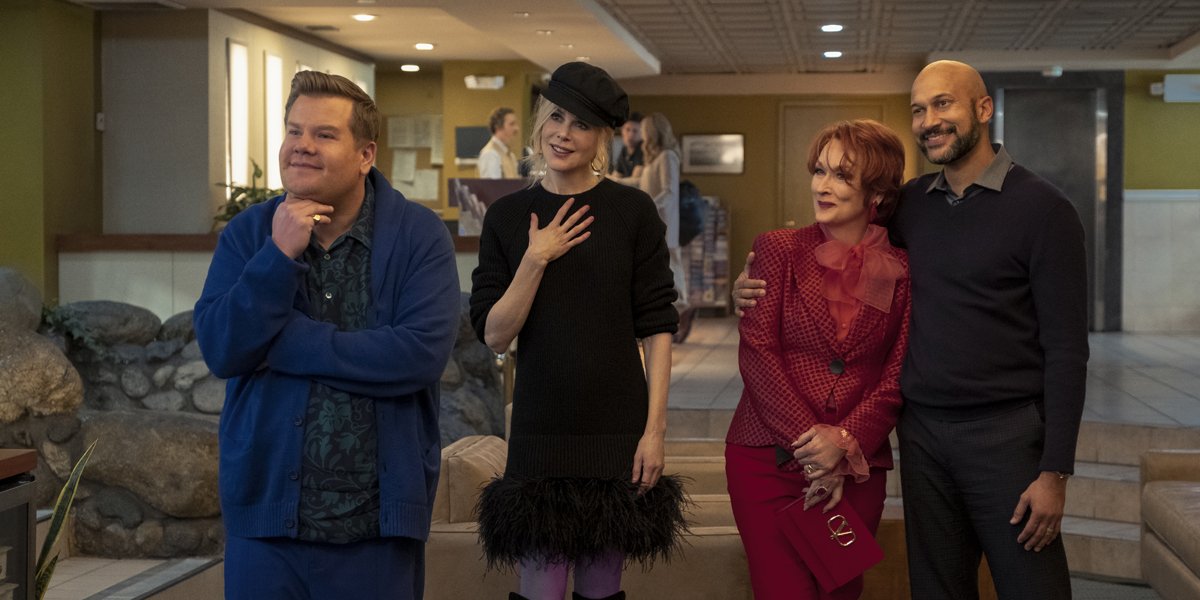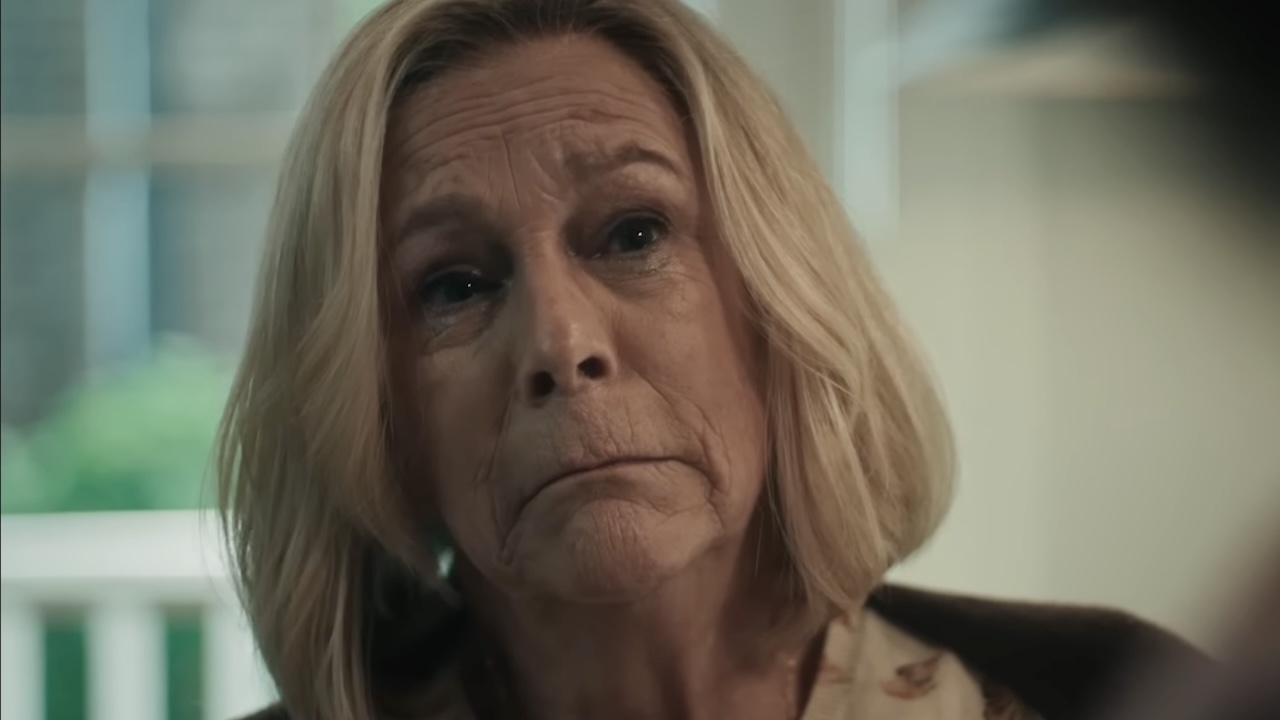No film has the obligation to be made for absolutely everybody. Obviously there are blockbusters that reach a broad audience, but it’s perfectly fine when not every segment of the movie-going populace demonstrates interest. And on the flipside, features that are specifically made for niche groups have no responsibility to try and make appeals to people outside their target demographics. Artists have the prerogative to speak to any audience they choose, and subjective opinion determines the people who make up that audience.
It is in this light that Ryan Murphy’s The Prom is perfectly respectable. In addition to having what is a very positive message at its core, it is a movie that goes full bore in demonstrating its extreme love for the musical genre – not only featuring show tune number after show tune number, but putting the world of Broadway at the center of its plot. An adaptation of the stage production of the same name, it’s a film that is very clearly made for those who can’t get enough of singing and dancing in their cinema, and it seems a fair bet that when those individuals find it on Netflix they will appreciate it appropriately.
What it’s also not, though, is either an introductory course, or an exercise in genre evangelism. By the same token that it’s a love letter to the extravagance of musicals, it’s not a film built to win over those who aren’t already invested and typically look for their entertainment elsewhere. There’s nothing wrong with that, but I do personally happen to be a part of that latter camp, and judge it thusly – and by extension I found it to be tepid and unfunny, with a collection of unlikable characters, basic plotting, and an underwhelming soundtrack.
The two primary unlikable characters are Dee Dee Allen (Meryl Streep) and Barry Glickman (James Corden) – Broadway stars who get a massive blow delivered to their giant egos when their latest show, a musical about Eleanor Roosevelt, is eviscerated by critics and shutters after one night. Afraid that their respective days of fame and fortune are coming to an end, they scheme with another pair of out-of-work actors, Angie (Nicole Kidman) and Trent (Andrew Rannells), to find a solution to their problems, and they wind up discovering one in the plight of a teenager in Indiana named Emma Nolan (Jo Ellen Pellman).
Emma wants to be like any normal girl and go to her high school prom, but the Parent-Teacher Association – headed by the bigoted Mrs. Greene (Kerry Washington) – takes exception to the fact that she is a lesbian who wishes to bring another girl as her date. The conflict makes national news as the dance is threatened with cancelation, which is what brings Dee Dee, Barry, Angie, and Trent to the Midwest. The actors believe that public activism is the key to reignite their flailing careers… but getting involved for the wrong reasons winds up having serious consequences.
Thinly-drawn characters results in big names like Meryl Streep and Nicole Kidman playing altered versions of the same cliché.
Clearly it’s the intention of Dee Dee, Barry, Angie and Trent to be completely terrible people so that they have a starting place for their arcs on their way to becoming decent, but the work is a bit overshot, as it’s really made impossible to connect with any of them. Lacking any clever dialogue, they don’t even have comedy working for them as a backdoor to likability. The enjoyable past works of Meryl Streep, Nicole Kidman and Andrew Rannells gives them at least some extra tolerability, but mostly you just wish they were spending their time playing better characters.
It’s not just that it’s a challenge to watch the groups’ antics, but also that the work done to make them stand out as individuals is shallow. The four actors all just play the same “Failed Actor” trope with one individual twist (Dee Dee is past her prime, Barry has never achieved true stardom, Angie is a career-long backup player, and Trent is solely remembered for one bad TV role). They’re all variations on the same cliché, and by the end it’s really only Dee Dee and Barry who get fleshed out conclusions, as the other two have to settle for lame, tacked-on endings.
Your Daily Blend of Entertainment News
That leaves Emma to be the moral pillar at the center of The Prom, and while Jo Ellen Pellman certainly has a pretty singing voice, the character doesn’t stand out as much more than the prop that the protagonists try to use her as in the story. She’s drowned out by the star power of the rest of the cast, as she has no real agency because that would mean taking action away from the more famous co-stars.
The musical numbers in The Prom feel like they’re excuses for not doing any heavy-lifting in the storytelling.
Watching The Prom, one can’t help but feel like part of the reason the characters and plotting is so dull is because the greater focus and attention is being put into the songs and choreography. In the same way that a poorly made action movie can get lost in explosions and gunfights, there is a surface level appreciation you can have for the effort, but it’s built on a poor foundation. If it feels like the only reason Angie is having a heart-to-heart with Emma is because Nicole Kidman hasn’t had the chance to be the prominent voice in a song yet, a level of artifice has been created that disrupts the entire experience (and the specific circumstance is definitely not helped by the characters professing a closeness that is based on absolutely nothing).
The Prom’s songs have positive messages, but they all blend together and are rendered immemorable.
Ultimately the real death knell for The Prom is just how underwhelming the soundtrack is. With the exception of "Love Thy Neighbor," which is performed primarily by Trent in a 1980s-esque mall sequence, most of the songs blur together with similar styles and singular messages. The performances are certainly strong, with no weak voice present in the ensemble, but I was also shocked to find myself not humming or reflecting on a single track following my screening.
While I can’t say that I’m predisposed to liking musicals, they certainly do have the potential to surprise me, and I could create a full list of titles that have.
The Prom
, unfortunately, isn’t one of them. It’s not fun that I would take away from anyone who does love the genre, but I also most certainly can’t recommend it to anyone who shares general sentiments with me in that arena.

Eric Eisenberg is the Assistant Managing Editor at CinemaBlend. After graduating Boston University and earning a bachelor’s degree in journalism, he took a part-time job as a staff writer for CinemaBlend, and after six months was offered the opportunity to move to Los Angeles and take on a newly created West Coast Editor position. Over a decade later, he's continuing to advance his interests and expertise. In addition to conducting filmmaker interviews and contributing to the news and feature content of the site, Eric also oversees the Movie Reviews section, writes the the weekend box office report (published Sundays), and is the site's resident Stephen King expert. He has two King-related columns.

